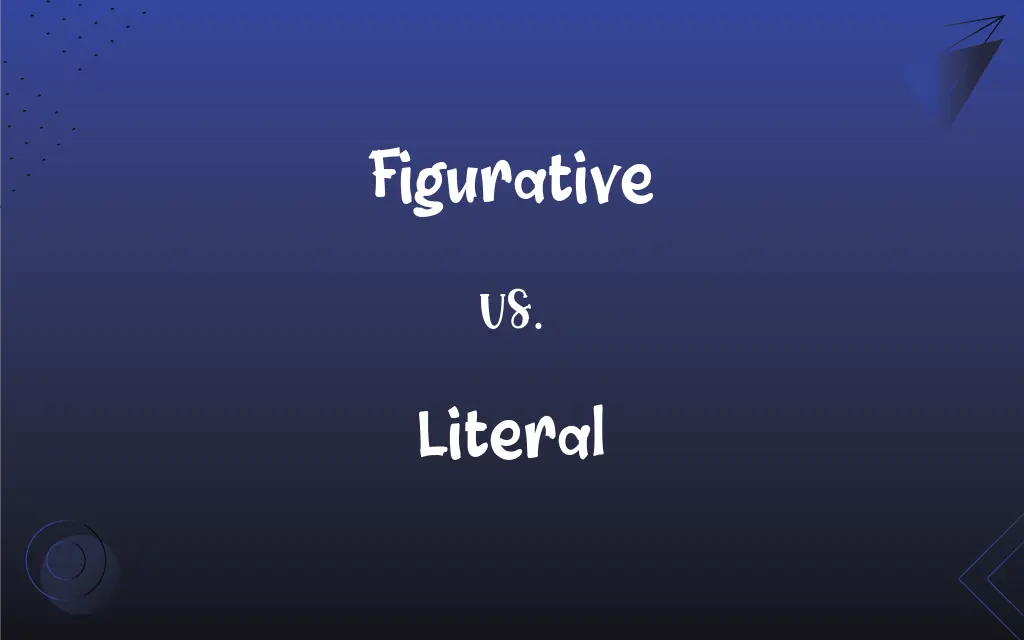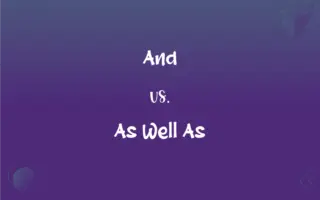Figurative vs. Literal: What's the Difference?
Edited by Aimie Carlson || By Janet White || Published on February 9, 2024
Figurative language involves imaginative or symbolic use of words for effect, whereas literal language means exactly what it says without embellishment.

Key Differences
Figurative language adds color and imagination to expressions, often using metaphors, similes, and personification. Literal language, in contrast, sticks to the exact, dictionary meanings of words without deviating for effect or emphasis.
The purpose of figurative language is to evoke emotions, create vivid imagery, or convey complex ideas in an engaging manner. Literal language aims for clarity and precision, ensuring that the message is understood exactly as intended.
Figurative language is commonly used in creative writing, poetry, and everyday idioms. Literal language is favored in technical writing, legal documents, and situations requiring factual accuracy.
Figurative expressions require interpretation and an understanding of context to grasp the implied meaning. Literal expressions are straightforward and do not require interpretation beyond the surface level.
Examples of figurative language include phrases like "heart of stone" or "time is a thief," which are not to be taken literally. Literal language would describe things as they are: "a hard heart" or "time passes."
ADVERTISEMENT
Comparison Chart
Meaning
Uses symbols, metaphors, and exaggerations
Means exactly what the words state
Purpose
To create imagery, emotion, or emphasize
To convey information clearly and precisely
Context
Often used in poetry, literature, and speech
Used in technical, legal, and factual texts
Interpretation
Requires understanding of context and culture
Direct and straightforward, no interpretation needed
Examples
"Break a leg," meaning good luck
"Break a leg," literally fracturing a leg
ADVERTISEMENT
Figurative and Literal Definitions
Figurative
Figurative language uses metaphors and comparisons to suggest a resemblance or analogy.
He has a heart of stone.
Literal
Literal language means exactly what it says, adhering to the direct meaning of words.
He has a stone in his shoe.
Figurative
Figurative speech often personifies objects, giving them human-like qualities.
The wind whispered through the trees.
Literal
It is preferred in contexts where precision and clarity are essential.
Please turn left at the next intersection.
Figurative
It exaggerates or alters the common meanings of words for emphasis or effect.
I'm so hungry I could eat a horse.
Literal
It is used to convey facts and information accurately and clearly.
The report is due tomorrow.
Figurative
Figurative expressions are used to evoke emotions and create vivid imagery.
Time is a thief.
Literal
Literal expressions are direct, with no hidden or implied meanings.
The cat is on the mat.
Figurative
It includes idioms and phrases that convey meanings different from their literal interpretation.
It's raining cats and dogs.
Literal
Literal language forms the basis of straightforward communication.
It's raining heavily outside.
Figurative
Based on or making use of figures of speech; metaphorical
Figurative language.
Literal
Conforming or limited to the simplest, nonfigurative, or most obvious meaning of a word or words.
Figurative
Containing many figures of speech; ornate.
FAQs
Why use figurative language?
It enhances writing and speech by adding depth, emotion, and imagery.
How does literal language differ?
Literal language means exactly what it says, with no embellishment or metaphor.
Can figurative language be confusing?
Yes, it can be if the listener or reader isn't familiar with the context or expression.
Is literal language easier to understand?
Generally, yes, because it conveys the exact meaning of words.
Can the same phrase be both figurative and literal?
Yes, depending on the context in which it is used.
Are technical manuals written in literal language?
Yes, for clarity and precision.
Is understanding figurative language a cultural aspect?
Yes, many expressions are culturally specific and require cultural knowledge.
Why is figurative language used in advertising?
To create memorable and persuasive messages.
What is figurative language?
It's using words in an imaginative way to create a special effect or meaning.
Do children understand figurative language?
They learn it over time; younger children may take things more literally.
How is literal language used in law?
For exactness and to avoid ambiguity in legal documents and proceedings.
Are idioms considered figurative language?
Yes, idioms are a common form of figurative language.
Can figurative language be found in everyday conversation?
Yes, it's common in daily speech, often through idioms and metaphors.
How does one identify figurative language?
By looking for exaggerations, comparisons, and non-literal interpretations of phrases.
Is figurative language a sign of language mastery?
It often indicates a higher level of language proficiency and creativity.
Can literal language be creative?
While it's direct, creative uses can be found, especially in clear and concise communication.
Is understanding literal language straightforward?
Usually, as it involves taking words at their face value.
Is figurative language important in poetry?
Very much so; it's a key element in creating vivid and evocative imagery.
Are news reports written in literal language?
Typically, yes, to accurately convey information.
Can literal interpretations lead to misunderstandings?
Yes, especially if figurative language is interpreted literally.
About Author
Written by
Janet WhiteJanet White has been an esteemed writer and blogger for Difference Wiki. Holding a Master's degree in Science and Medical Journalism from the prestigious Boston University, she has consistently demonstrated her expertise and passion for her field. When she's not immersed in her work, Janet relishes her time exercising, delving into a good book, and cherishing moments with friends and family.
Edited by
Aimie CarlsonAimie Carlson, holding a master's degree in English literature, is a fervent English language enthusiast. She lends her writing talents to Difference Wiki, a prominent website that specializes in comparisons, offering readers insightful analyses that both captivate and inform.







































































